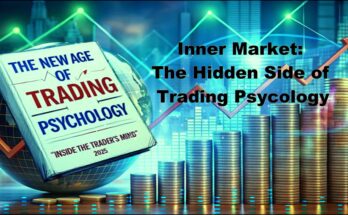The Dark Side of Trading Psychology – The Infinite Game
Trading often appears glamorous—screens filled with flashing numbers, the promise of independence, and the adrenaline of big wins. Beneath the surface, however, lies a far more complex psychological landscape. When approached with a finite mindset—treating trading like a short-term game to “win” or “beat the market”—many traders fall prey to destructive cycles of fear, greed, and overconfidence. To survive and truly thrive, one must recognize that trading is not a single battle with a clear end, but an infinite game requiring adaptability, humility, and emotional mastery.
Finite vs. Infinite Mindset
In a finite game, there are clear rules, fixed players, and a clear end point—like a chess match or a sports season. Success is measured by wins and losses, and “victory” is final. In trading, thinking this way can be dangerous. Markets are ever-changing, rules evolve, and new participants enter constantly. Viewing trading as finite encourages risky, short-sighted behavior: chasing quick profits, overleveraging, and trying to “make it back” after a loss. By contrast, an infinite mindset focuses on staying in the game indefinitely, prioritizing sustainability, continuous learning, and process over immediate results.
The Hidden Psychological Traps
- Greed and Overexposure – A string of wins can create euphoria, convincing traders they’ve mastered the market. Overconfidence often leads to oversized positions and poor risk control, leaving accounts vulnerable to devastating reversals.
- Fear and Paralysis – After losses, fear can push traders into hesitation, second-guessing every entry, or refusing to act when opportunity appears. This emotional whiplash kills consistency.
- Revenge Trading – The desperate urge to recover losses fast can override logic, leading to impulsive, emotionally driven trades.
- Confirmation Bias – Traders may ignore new data that contradicts their positions, clinging to outdated beliefs in an attempt to avoid psychological pain.
- Identity Attachment – When self-worth becomes tied to daily profit and loss, swings in account equity trigger swings in self-esteem. This fragile identity creates burnout and emotional instability.
Why the Infinite Game Matters
Thinking in infinite terms shifts the focus from short-term wins to long-term resilience. Instead of obsessing over “beating the market,” traders prioritize learning, capital preservation, and process improvement. Losses become tuition—valuable data for refining strategy. Wins are steps forward, not final trophies. By reframing trading as an ongoing journey rather than a destination, traders maintain psychological balance and protect against destructive extremes.
Practical Principles for Infinite-Game Trading
- Risk Management First – Position sizing and stop-loss discipline ensure survival during inevitable downturns.
- Process Over Outcome – Judge success by how well you followed your rules, not just by profit for the day.
- Continuous Adaptation – Markets evolve; so must your skills, strategies, and mindset.
- Emotional Awareness – Journaling trades and feelings highlights patterns of fear, greed, or impulsivity.
- Long Horizon Perspective – Focus on consistency over months and years, not the outcome of a single session.
The True Dark Side
The most dangerous aspect of trading psychology is not simply losing money—it’s losing clarity, discipline, and emotional health. Without boundaries, traders may spiral into obsessive monitoring, sleepless nights, and destructive self-talk. An infinite mindset acts as an anchor, reminding you that the goal is endurance, growth, and freedom—not a single jackpot.
Trading mastery lies in balancing the thrill of opportunity with the patience of long-term vision. Embrace the infinite game, and the dark side of trading psychology loses its grip, replaced by a steady pursuit of excellence and resilience.

